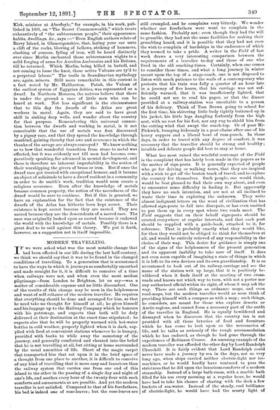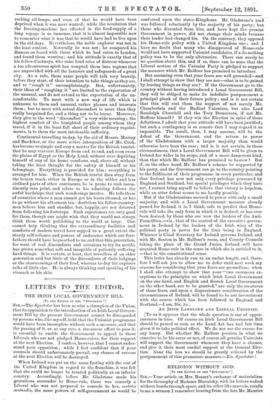MODERN TRAVELLING.
IF we were asked what was the most notable change that had been effected in our life during the last half-century, we think we should say that it was to be found in the changed conditions of travelling. To a generation that is accustomed to have the ways in which it journeys so comfortably smoothed and made straight for it, it is difficult to conceive of a time when railways were not, and when even the most modest pilgrimage—from London to Brighton, let us say—was a matter of considerable expense and no little discomfort. One 'of the results of this change may be seen in the helplessness and want of self-reliance of the modern traveller. He requires that everything should be done and arranged for him, so that be need take no thought for himself at all; he gives himself and his luggage up to the Railway Company which he honours with his patronage, and expects that both will be duly delivered at their destination at the exact time stipulated ; he expects also that he will be properly warmed with hot-water bottles in cold weather, properly lighted when it is dark, sup- plied with food at convenient stations whenever he is hungry, provided with books to while away the monotony of the journey, and generally comforted and cheated into the belief that he is not travelling at all, but sitting at home surrounded by the usual amenities of life. Short of the magic carpet that transported him that sat upon it in the brief space of a thought from one place to another, it is difficult to conceive of any kind of travelling that is more easy and luxurious than the railway system that carries one from one end of this island to the other in the passing of a single day and night of one's life, and soothes every hour of the twenty-four with such comforts and amusements as are possible. And yet the modern traveller is not satisfied. Compared to that of his forefathers, his bed is indeed one of rose-leaves ; but the rose-leaves are
still crumpled, and he complains very bitterly. We wonder whether our forefathers were wont to complain in the same fashion. Probably not : even though they had the will to grumble, they had not the same facilities for making their grumbling heard, and it is possible that they had not even the wish to complain of hardships in the endurance of which they seemed to take a pride. A writer in the Field of last week draws a very interesting comparison between the requirements of a traveller to-day and those of one who lived in the old coaching-times. Certainly, when one comes to consider those times, and what a long journey in winter meant upon the top of a stage-coach, one is not disposed to listen with much patience to the wails of a contemporary who protests that his train was fully a quarter of an hour late in a journey of five hours, that his carriage was not suf- ficiently warmed, that it was insufficiently lighted, that he could not see to read his paper, or that the dinner provided at a railway-station was unsuitable to a person of his delicacy. Think of Tom Brown going to school for the first time, his shivering little body tightly buttoned up in his jacket, his little legs dangling forlornly front the high seat, with no rest for his feet, nor any rug to shield him from the cutting wind that swept the coach-top. Or of poor Mr. Pickwick, bumping hideously in a post-chaise after one of his heavy suppers and a liberal bowl of rum-punch. In those days, in order to travel with any degree of comfort, it was necessary that the traveller should be strong and healthy ; invalids and delicate people did best to stay at home.
What has most raised the wrathful contempt of the Field is the complaint that has lately been made in the papers as to the matter of sign-posts. It is generally expected of people who go for driving or walking tours, that they are inspired with a wish to get off the beaten track of travel, and to explore the country for themselves. Such people, one would think, would be best pleased to find their own way about, and even to encounter some difficulty in finding it. But apparently they have no such intention, and are not at all inclined to waste their time in exploring 'the .unknown. They write almost indignant letters on the want of civilisation that has allowed sign-posts to fall into disrepair, or has even omitted to put them up in every spot where two roads meet. The Field suggests that on their behalf sign-posts should be erected everywhere at regular intervals, and that each post should be supplied with a guide-book, attached to it, for reference. That is probably exactly what they would like, for then they would not be obliged to think for themselves at all, and would be entirely relieved of any responsibility in the choice of their way. This desire for guidance is simply one of the signs of the helplessness of the present generation and its apparent inability to take care of itself. It does not even seem capable of imagining a state of things in which it is left to its own devices and its own guardianship. It is so accustomed to look out of its railway-carriage and see the name of the station writ up large, that it is positively be- wildered when it finds itself at the meeting of two cross- roads and knows not which way to turn, with not a porter nor any authorised official within its sight, of whom it may ask the way. There are such things as ordnance maps, and even road-maps, but the modern traveller would as soon think of providing himself with a compass as with a map ; such things, he considers, are meant for those who explore deserts or Arctic regions, and cannot form a necessary part of the outfit of the traveller in England. He is equally bewildered and dismayed when he discovers that the country inn is not provided with all those luxuries of food and furniture which he has come to look upon as the necessaries of life, and he talks as seriously of the rough accommodation which he has endured, as though he had gone through the experiences of Robinson Crusoe. An amusing example of the modern traveller was afforded the other day by Lord Randolph Churchill. It is fairly evident that Lord Randolph could never have made a journey by sea in the days, not so very long ago, when ships carried neither electric-light nor ice- machines, or he would hardly have ventured to pass the strictures that he did upon the luxurious comforts of a modern steamship. Instead of a large bath-room, with a marble bath filled for his use every morning at a regular hoar, he would have had to take his chance of sharing with the deck a few buckets of sea-water. Instead of the steady, cool brilliance of electric-light, he would have had the scanty light of reeking oil-lamps, and even of that he would have been deprived when it was most wanted ; while the revolution that the freezing-machine has effected in the food-supply of a long voyage is so immense, that it is almost impossible now to remember what it was that he would have had to live upon in the old days. Nevertheless, the noble explorer was not in the least content. Naturally he was not ; he compared his dinners on board with those which he had eaten in London, and found them wanting ; and his attitude is exactly that of his fellow-Cockneys, who raise loud cries of distress whenever a too adventurous spirit has tempted them into regions that are unprovided with all the luxuries and safeguards of a great city. As a rule, these same people will talk very bravely, before they start, of their intention to take things as they are, and to "rough it" uncomplainingly. But, unfortunately, their ideas of " roughing it " are limited to the expectation of the unusual, and do not extend to the expectation of the un- -comfortable. To meet with a new way of life which is unknown to them and unusual, rather pleases and interests them ; but to meet with actual discomfort is more than they really bargained for, and a thing not to be borne. Moreover, they give to the word " discomfort" a very wide meaning ; the highest comfort of the benighted people among whom they travel, if it in the least fall short of their ordinary require. ments, is to them the most intolerable suffering.
Continental travelling to-day, by the aid of Messrs. Murray and Baedeker, or the more active interposition of Mr. Cook, has become so simple and easy a matter for the British tourist, that he may traverse Europe from end to end, and even cross the plains of Egypt or the Holy Land, without ever depriving himself of any of his home comforts, and, above all, without taking the least thought for the safety of himself or his belongings. Everything is provided for him ; everything is arranged for him. When the 'British tourist does stray from the beaten track, either in Europe or in the wilder and less civilised parts of other continents, he is prone to rush incon- tinently into print, and relate to his admiring fellows the awful hardships that such wanderings involve. He tells them of countries where a man cannot get his boots cleaned, or has to go without his afternoon tea : doubtless his fellow-country. men believe him and shudder, but, happily, are not deterred from following his footsteps. Such experiences ate very good for them, though one might wish that they would not always think them worth publishing to the world at large. One cannot help thinking that the extraordinary facilities and comforts of modern travel have sapped to a great extent the sturdy self-reliance and powers of endurance which our fore- fathers should have bequeathed to us, and that this generation, for want of real discomforts and occasions to try its mettle, has grown somewhat soft and incapable of patiently suffering hard thingi. It is certain, at least, that travellers of an older generation said but little of the discomforts of their lodgings or the shortcomings of their food, whereas to-day the explorer talks of little else. He is always thinking and speaking of his stomach or his skin.



































 Previous page
Previous page